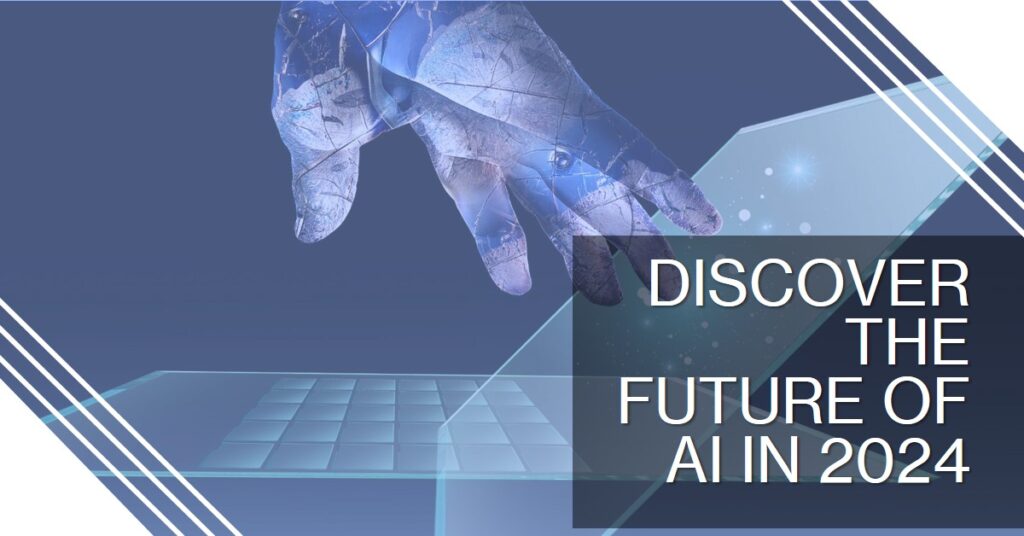-
Introduction: The Rapid Evolution of AI and Its Impact on Various Industries
- 1. Enhanced Natural Language Processing (NLP) and Conversational AI
- 2. Ethical AI and Responsible Automation
- 3. Reinforcement Learning for Autonomous Systems
- 4. Personalized Healthcare with Precision Medicine and Medical Imaging Analysis
- 5. Edge Computing for Faster Data Processing and Privacy Protection
- Conclusion: Embrace the Future of Artificial Intelligence in 2024 and Beyond
Introduction: The Rapid Evolution of AI and Its Impact on Various Industries
Artificial Intelligence (AI) has quickly emerged as a transformative technology with the potential to revolutionize various industries. With rapid advancements in AI technology, we are witnessing a significant shift in how businesses operate and individuals interact with technology.
The future of AI holds immense promise, as it continues to evolve and shape our world. From self-driving cars to virtual assistants, AI is becoming increasingly integrated into our daily lives.
As we delve into the realm of AI, it is crucial to understand the emerging trends that are driving its development and the potential impact it will have on different sectors.
AI technology advancements have paved the way for exciting possibilities in fields such as healthcare, finance, manufacturing, transportation, and more.
From diagnosing diseases with greater accuracy to optimizing financial transactions, AI is empowering industries to achieve new levels of efficiency and innovation.
In this section, we will explore some of the key trends shaping the future of AI. We will delve into topics such as machine learning algorithms, natural language processing, computer vision, robotics, and automation.
By understanding these emerging trends, we can gain insights into how AI will continue to transform various sectors and create new opportunities for businesses worldwide.
Join us on this journey as we uncover the rapid evolution of AI and its profound impact on industries across the globe.
1. Enhanced Natural Language Processing (NLP) and Conversational AI
In recent years, there have been significant advancements in Natural Language Processing (NLP) technology, which has paved the way for the development of conversational AI. This emerging field focuses on creating intelligent chatbots, voice assistants, and virtual customer service agents that can engage in human-like conversations.
Enhanced NLP algorithms enable these conversational AI systems to understand and interpret human language more accurately. They can analyze the context of a conversation, identify user intent, and generate appropriate responses in real-time. This capability has revolutionized customer service by providing instant support and personalized interactions.
Conversational chatbots have become increasingly popular across various industries as they offer round-the-clock assistance without the need for human intervention.
These chatbots can handle a wide range of customer queries, provide product recommendations, process transactions, and even troubleshoot technical issues.
Voice assistants like Siri, Alexa, and Google Assistant have also benefited from NLP advancements. They can understand spoken commands more accurately and execute tasks such as setting reminders, playing music, or providing information based on natural language queries.
Virtual customer service agents powered by NLP are transforming the way businesses interact with their customers. These agents can handle large volumes of inquiries simultaneously while maintaining a high level of accuracy and efficiency. They not only save time for both customers and businesses but also enhance overall customer satisfaction.
As NLP technology continues to evolve, we can expect further improvements in conversational AI systems. These advancements will enable more seamless interactions between humans and machines, making them an integral part of our daily lives across various industries such as e-commerce, healthcare, banking, and many others.
2. Ethical AI and Responsible Automation
Ethics in artificial intelligence and responsible automation practices are crucial considerations in the development and deployment of AI systems. As AI continues to advance, it becomes essential to address potential biases and ensure that these technologies are used responsibly.
One key aspect of ethical AI is the detection and prevention of bias. AI systems learn from vast amounts of data, which can inadvertently reflect biases present in society. It is important to implement mechanisms that actively identify and mitigate biased outcomes, ensuring fair and unbiased decision-making processes.
Responsible automation practices involve considering the impact of AI on various stakeholders, including employees, customers, and society as a whole.
This includes understanding potential job displacement due to automation and implementing measures to support affected individuals through retraining or other means.
Organizations must also prioritize transparency in their use of AI technologies. Clear communication about how AI systems work, what data they use, and how decisions are made is essential for building trust with users and mitigating concerns about privacy or misuse.
Additionally, ongoing monitoring and evaluation of AI systems are necessary to identify any unintended consequences or negative impacts. Regular audits can help ensure that these technologies align with ethical standards throughout their lifecycle.
By addressing ethics in artificial intelligence and practicing responsible automation, we can harness the benefits of AI while minimizing risks associated with bias or misuse.
This approach promotes fairness, accountability, and societal well-being as we navigate an increasingly automated future.
3. Reinforcement Learning for Autonomous Systems
Reinforcement learning is a powerful technique that holds great potential for the development of autonomous systems, such as autonomous vehicles and robotics.
By combining adaptive learning algorithms with real-time decision making, these systems can continuously learn and improve their performance.
Autonomous vehicles rely on reinforcement learning to navigate complex environments and make decisions on the road. Through trial and error, these vehicles can learn optimal driving behaviors, adapt to changing road conditions, and enhance safety.
Similarly, in the field of robotics, reinforcement learning enables robots to learn from their interactions with the environment. This allows them to perform tasks more efficiently and effectively over time.
For example, a robot can learn how to grasp objects by attempting different approaches and receiving feedback based on the success or failure of each attempt.
One of the key advantages of reinforcement learning in autonomous systems is its ability to handle dynamic environments. These systems can quickly adapt their behavior based on new information or unexpected situations, ensuring that they are always making informed decisions.
Overall, reinforcement learning plays a crucial role in advancing autonomous systems by enabling them to continuously learn from experience and improve their capabilities.
As research in this field progresses, we can expect even more sophisticated and intelligent autonomous systems that are capable of handling complex tasks autonomously.
4. Personalized Healthcare with Precision Medicine and Medical Imaging Analysis
Precision medicine, coupled with the advancements in medical imaging analysis using AI algorithms, has paved the way for personalized healthcare. This innovative approach to healthcare aims to tailor medical treatments and interventions to individual patients based on their unique genetic makeup, lifestyle factors, and environmental influences.
One of the key applications of precision medicine is in the field of medical imaging diagnostics. By leveraging AI algorithms, healthcare professionals can analyze complex medical images such as CT scans, MRI scans, and X-rays with greater accuracy and efficiency.
These algorithms can detect subtle patterns and anomalies that may not be easily identifiable by human eyes alone.
The use of AI in medical imaging analysis has several benefits. Firstly, it allows for early detection of diseases and conditions by identifying even the smallest abnormalities in medical images. This early detection enables timely intervention and treatment planning.
Secondly, AI algorithms can aid in making more accurate diagnoses by providing quantitative measurements and objective assessments based on the analysis of large datasets. This reduces the risk of misinterpretation or subjective biases that can occur during manual image analysis.
Furthermore, personalized treatment plans can be developed based on the insights gained from precision medicine applications combined with AI-driven medical imaging analysis.
By considering an individual’s genetic profile, lifestyle factors, and specific disease characteristics identified through medical imaging, healthcare providers can tailor treatments to maximize efficacy while minimizing potential side effects.
Precision medicine applications combined with AI-driven medical imaging analysis have revolutionized personalized healthcare. These technologies enable early detection of diseases, more accurate diagnoses, and personalized treatment plans tailored to individual patients’ needs.
As these technologies continue to evolve and improve over time, we can expect further advancements in personalized healthcare that will ultimately lead to better patient outcomes.
5. Edge Computing for Faster Data Processing and Privacy Protection
Edge computing is a distributed computing infrastructure that brings data processing closer to the source of data generation. In this section, we will explore the role of edge computing in enabling faster data processing and enhancing privacy protection.
With the proliferation of IoT devices, there is an increasing need for efficient and real-time data processing. Edge computing addresses this challenge by moving computational power closer to the devices themselves, reducing latency and improving response times.
By processing data at the edge of the network, near where it is generated, organizations can achieve faster insights and make quicker decisions.
Furthermore, edge computing enhances privacy protection by minimizing the need for transmitting sensitive data to centralized cloud servers. Instead, data can be processed locally on edge devices or within local edge servers. This approach reduces the risk of unauthorized access or interception during transmission, ensuring better privacy and security for sensitive information.
The connectivity between IoT devices plays a crucial role in enabling effective edge computing. As these devices generate massive amounts of data, they need to be seamlessly connected to each other and to local edge servers for efficient processing. Reliable connectivity ensures smooth communication between devices and enables real-time analysis at the network’s edges.
By leveraging distributed computing infrastructure and optimizing IoT device connectivity, organizations can harness the power of edge computing to enhance their operations while safeguarding sensitive information.
Conclusion: Embrace the Future of Artificial Intelligence in 2024 and Beyond
As we look towards the future of technology, it is clear that artificial intelligence (AI) will play a significant role in shaping our world. Embracing the advancements in AI can bring numerous benefits to various industries and sectors.
One of the key benefits of embracing AI is its ability to automate tasks and processes, leading to increased efficiency and productivity. With AI, businesses can streamline operations, reduce costs, and deliver better results. Additionally, AI has the potential to revolutionize customer experiences by providing personalized recommendations and tailored solutions.
However, it is important to acknowledge that embracing AI also comes with its own set of challenges. Privacy concerns, ethical considerations, and job displacement are some of the issues that need to be addressed as we integrate AI into our daily lives.
Nonetheless, it is crucial for individuals and organizations alike to embrace the future of artificial intelligence. By understanding its capabilities and limitations, we can harness its power for positive change. Whether it’s in healthcare, transportation, or any other field, AI has the potential to transform industries and improve lives.

A prominent SEO and Business Analyst with 5+ years of experience helping businesses achieve growth



